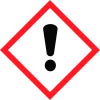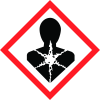Sikaflex Self‐Leveling Sealant
Sika Corporation
Revision date : 2017-09-18


Note: Ingredients listed on restricted chemical lists
EC/CAS
4098-71-9
Name of the chemical
3-isocyanatomethyl-3,5,5-trimethylcyclohexyl isocyanate
Concentration
>=0.1-<1%
EC/CAS
101-68-8
Name of the chemical
4,4’-Methylenediphenyl diisocyanate
Concentration
>=0.1-<1%
General Information
Revision date
2017-09-18
Product name
Sikaflex Self‐Leveling Sealant
Supplier name
Sika Corporation
Emergency telephone
800-424-9300
Icons in SDS
Company Information
Company name
Sika Corporation
E-mail address of the competent person responsible for the Safety Data Sheet
ehs@sika-corp.com
GHS Information
Signal word
Danger
Hazard Codes
Hazard statements (CLP)
H227, H317, H334, H350i, H373
Hazard statements
Code
Statements
H227
Combustible liquid
H317
May cause an allergic skin reaction
H334
May cause allergy or asthma symptoms or breathing difficulties if inhaled
H350i
May cause cancer by inhalation
H373
Causes damage to organs through prolonged or repeated exposure
Precautionary statements
Code
Statements
P201
Obtain special instructions before use.
P202
Do not handle until all safety precautions have been read and understood.
P210
Keep away from heat, hot surface, sparks, open flames and other ignition sources. - No smoking.
P260
Do not breathe dust/fume/gas/mist/vapors/spray.
P272
Contaminated work clothing should not be allowed out of the workplace.
P280
Wear protective gloves/protective clothing/eye protection/face protection.
P281
Use personal protective equipment as required.
P285
In case of inadequate ventilation wear respiratory protection.
P302+P352
IF ON SKIN: wash with plenty of water.
P304+P341
IF INHALED: If breathing is difficult, remove victim to fresh air and keep at rest in a position comfortable for breathing.
P308+P313
IF exposed or concerned: Get medical advice/attention.
P333+P313
IF SKIN irritation or rash occurs: Get medical advice/attention.
P363
Wash contaminated clothing before reuse.
P370+P378
In case of fire: Use ... to extinguish.
P403+P235
Store in a well-ventilated place. Keep cool.
P405
Store locked up.
P501
Dispose of contents/container to ...
Section 2
2.1 Classification of the substance or mixture
Flammable liquids, Category 4 H227: Combustible liquid. Respiratory sensitization, Category 1 H334: May cause allergy or asthma symptoms or breathing difficulties if inhaled. Skin sensitization, Category 1 H317: May cause an allergic skin reaction. Carcinogenicity, Category 1A (Inhalation) H350i: May cause cancer by inhalation. Specific target organ systemic toxicity - H373: May cause damage to organs through repeated exposure, Category 2, hearing prolonged or repeated exposure if inhaled. organs (Inhalation)
Signal word
Danger
Hazard statements
H227 Combustible liquid. H317 May cause an allergic skin reaction. H334 May cause allergy or asthma symptoms or breathing difficulties if inhaled. H350i May cause cancer by inhalation. H373 May cause damage to organs (hearing organs) through prolonged or repeated exposure if inhaled.
Prevention
P201 Obtain special instructions before use. P202 Do not handle until all safety precautions have been read and understood. P210 Keep away from heat/sparks/open flames/hot surfaces. No smoking. P260 Do not breathe dust/ fume/ gas/ mist/ vapors/ spray. P272 Contaminated work clothing must not be allowed out of the workplace. P280 Wear protective gloves. P281 Use personal protective equipment as required. P285 In case of inadequate ventilation wear respiratory protection.
Response
P302 + P352 IF ON SKIN: Wash with plenty of soap and water. P304 + P341 IF INHALED: If breathing is difficult, remove person to fresh air and keep comfortable for breathing. P308 + P313 IF exposed or concerned: Get medical advice/ attention. P333 + P313 If skin irritation or rash occurs: Get medical advice/ attention. P363 Wash contaminated clothing before reuse. P370 + P378 In case of fire: Use extinguishing measures that are appropriate to local circumstances and the surrounding environment for extinction.
Storage
P403 + P235 Store in a well-ventilated place. Keep cool. P405 Store locked up.
Disposal
P501 Dispose of contents/ container to an approved waste disposal plant. Warning : Reports have associated repeated and prolonged exposure to some of the chemicals in this product with permanent brain,liver, kidney and nervous system damage. Intentional misuse by deliberate concentration and inhalation of vapors may be harmful or fatal. See Section 11 for more detailed information on health effects and symptoms. There are no hazards not otherwise classified that have been identified during the classification process. There are no ingredients with unknown acute toxicity used in a mixture at a concentration >= 1%.

